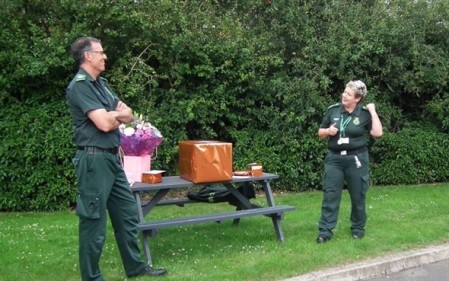Lincolnshire paramedic John Cannon, pictured, circa 1990.
One of our paramedics in Lincolnshire has begun his well-earned retirement after 34 years’ of saving lives on the 999 frontline.
John Cannon, 64, who lives in Louth, joined the ambulance service when he was 30-years-old. He transitioned from a career in accounting.
Unlike the weeks of intensive training and university courses that our frontline colleagues experience now, John did a few weeks of initial training in Leicestershire followed by a two-week driving course, before he was thrown into the action.
John said: “The job now is completely unrecognisable to the job I signed up for when I first joined what was then called Lincolnshire Ambulance Service.
“I did my initial training, which involved first-aid, and a day’s induction at my station and then I was out on the road.”
When John joined the service back in 1986, he would have been known as an ‘ambulance man’ and the limited equipment he had included splints, a first-aid kit and an oxygen tank.
Over the years John has experienced first-hand the changes that have happened in the ambulance service, including the introduction of paramedics and technicians who can provide more advanced clinical care outside of a hospital environment.
John said: “We can explore a patient’s clinical needs in more depth now than we ever could when I started out.
“We have more clinical skills and knowledge which has made a positive difference to the people we treat.
“This means that we no longer simply transport poorly people to the hospital, but we can make a difference to someone on scene and hopefully stabilise their condition or improve their situation by the time we get them to A&E.
“The biggest difference I have witnessed includes how we could treat patients with severe asthma and COPD by giving them the drugs they need to help them when they are in medical distress.”
While the role has become more clinically advanced over recent years, one priority that remains consistent, says John, is that the patient’s needs are at the forefront of all decision making.
He said: “At the end of the day the job is about the patient and doing what is best for them.
“Sometimes that means just being there to hold a person’s hand when they are scared and being able to provide them with the reassurance that you are there to help them.”
Throughout his career, John has faced some very tough moments with some very poorly patients, but he cites responding to a medical emergency of someone he knew personally, as sticking out in his memory.
He said: “A man I played golf with from time to time, and who I knew from school, experienced a cardiac arrest in town and I was the one on scene who performed cardiopulmonary resuscitation (CPR) and rushed him to hospital.
“Luckily he survived and a year later he came over to me on the golf course and shook my hand.”
John credits his very understanding partner of 17 years, Tracey, as one of the reasons for being able to be an active frontline member of staff at EMAS for the past three and a half decades.
While John will now have more time to pursue his passions of golf, walking holidays and travels abroad, he has decided that he will still be picking up a couple of shifts a month as a bank paramedic, so he will still be supporting his colleagues when he is needed.

Sue Cousland, General Manager for the Lincolnshire Division of EMAS said:
“It was a pleasure to be invited to the socially distanced ‘send-off’ arranged by colleagues in recognition of John’s career in the ambulance service.
“It is rare to meet someone that all colleagues, without exception, respect and admire.
“It was obvious from the attendance and conversation on the evening that John has influenced and supported a large number of staff over the years, being the calm role model that we would all aspire to.
“I have no doubt that John’s main focus over the coming months and years will quite rightly be directed to family and spending more time on the golf course, however we are delighted that he will not be hanging up his green uniform completely.
“We wish John a long, healthy and happy retirement and thank him for his professionalism and dedication both to colleagues and to the Division over the last 34 years.
“Thank you, John.”